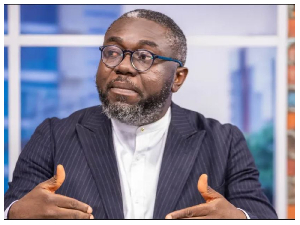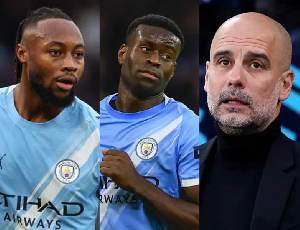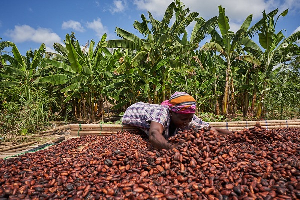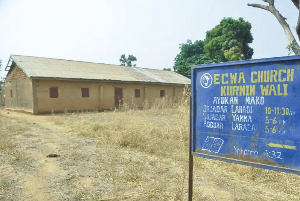Opinions of Friday, 28 September 2018
Columnist: Sena Agoha
We know the truth; Ghana has a 'Founder' not 'Founders'
In the mix of the argument whether Ghana should have “founders or founder’s day” which several scholars, politicians, historians and pioneers of Ghana’s liberation struggle debating and also the executive other by the current government for the 21st Sept to be recognized as “Kwame Nkrumah memorial day but not Founder’s day” has necessitate to go back to my basic history for in depth knowledge on who is referred to us founder in historical antecedent so far as religious and political legendary is concerned.
In basic school where most of us read social studies as the basic level of knowing or coming in contact with our origin and settlements, we realized from those stories that, there was one particular icon or motivator whose name was mentioned till the final destination of the people in every kingdom across; be it the Ashanti, Fante, Ewe etc. In the studies of the Mali empire (Manden Kurufaba) led by Sundiata Keita to established the kingdom was recognized in history as the founder of the Mali empire. Another name mentioned was Soumaoro Kanté (var.: Sumanguru Kanté) was a 13th-century king of the Sosso people. Seizing Koumbi Saleh, the capital of the recently defunct Ghana Empire. The names mentioned here were not the only fighters but their roles in the struggle achieved their heroism in history.
In religious history like Christianity, Islam, Buddhism, Ramakrishna mission to mention but few, their foundation was attributed to a particular personality as role model for his immerse contribution for the foundation of that religious association. Christianity believes by the followers was founded by Jesus Christ, Islam by Mohammed, Buddhism by Siddhartha Gautama and Ramakrishna by Ramakrishna Paramahansa despite the controversy of who the rightful initiators of these movement were, which in Christendom wondering about the founder of Christianity, (1 Corinthians 15:1-4 )is an excellent answer, "Now, brothers, I want to remind you of the gospel I preached to you, which you received and on which you have taken your stand.
By this gospel you are saved, if you hold firmly to the word I preached to you. Otherwise, you have believed in vain. For what I received I passed on to you as of first importance: that Christ died for our sins according to the Scriptures, that he was buried, that he was raised on the third day according to the Scriptures." makes it clear -- Jesus Christ is the founder of Christianity. Further reference Jesus commissioned the apostles to spread Christianity throughout the world (Matthew 28:18-20; Acts 1:8) -- but it was Jesus Himself who "founded" Christianity with His death, shed blood, and resurrection from the dead (Revelation 5:9-10). There were several role players in establishing the Christian Kingdom even before Christianity, the Pharisees were practicing Judaism in reading and interpretation of Torah as believe to be part of the old Testament which form the basic foundation of Christianity and history teaches that the apostles also contributed throughout the Life and death of the Savior but the name Jesus Christ supersede as the founder of Christianity. To mention, the individual organisations in Christianity referred to us the Churches recognized a character for his major contribution as the founder of the church despite others who might contributed some effort i.e Roman Catholic Church, Pentecost, Presby, Methodist etc.
Talking about political history using America as example to juxtapose the role of founders or founder in Ghana’s history is very vital to teach our dispensation and to put this issue of rewriting our history or to force some members of your political party in our history to our independence declaration to rest. In the context of American revolution against the Kingdom of Great Britain Historian Richard B. Morris in 1973 identified the following seven figures as the key Founding Fathers: John Adams, Benjamin Franklin, Alexander Hamilton, John Jay, Thomas Jefferson, James Madison, and George Washington.[2][3] Adams, Jefferson, and Franklin were members of the Committee of Five that drafted the Declaration of Independence. Hamilton, Madison, and Jay were authors of The Federalist Papers, advocating ratification of the Constitution. The constitutions drafted by Jay and Adams for their respective states of New York (1777) and Massachusetts (1780) were heavily relied upon when creating language for the US Constitution.[4] Jay, Adams and Franklin negotiated the Treaty of Paris (1783) that would end the American Revolutionary War.[5] Washington was Commander-in-Chief of the Continental Army and was President of the Constitutional Convention. All held additional important roles in the early government of the United States, with Washington, Adams, Jefferson, and Madison serving as President.
Jay was the nation's first Chief Justice, Hamilton was the first Secretary of the Treasury, and Franklin was America's most senior diplomat, and later the governmental leader of Pennsylvania. These names mentioned as founders of America played major role towards the independence declaration of America and just to ask the question pertaining to those supporting the motion “founders’ day” what were their roles and was it all about formation of UGCC to engage Dr. Kwame Nkrumah as full time secretary? I think these are questions we all need to ponder for better conclusion.
As the history goes, Dr Kwame Nkrumah after he resigned from the UGCC which slogan was “Self-government in the shortest possible time” formed the CPP which slogan also was “Self-government Now’. In the struggle and agitation towards liberation of our country from colonialism, the British convened a selected commission of middle-class Africans, including all of the Big Six except Nkrumah, to draft a new constitution that would give Ghana more self-government. Nkrumah saw, even before the commission reported, that its recommendations would fall short of full dominion status, and began to organise a Positive Action campaign. Nkrumah demanded a constituent assembly to write a constitution. When the governor, Charles Arden-Clarke, would not commit to this, Nkrumah called for Positive Action, with the unions beginning a general strike to begin on 8 January 1950. The strike quickly led to violence, and Nkrumah and other CPP leaders were arrested on 22 January, and the Evening News was banned.[52] Nkrumah was sentenced to a total of three years in prison, and he was incarcerated with common criminals in Accra's Fort James.[53]
Nkrumah's assistant, Komla Agbeli Gbedemah, ran the CPP in his absence; the imprisoned leader was able to influence events through smuggled notes written on toilet paper. The British prepared for an election for the Gold Coast under their new constitution, and Nkrumah insisted that the CPP contest all seats. The situation had become calmer once Nkrumah was arrested, and the CPP and the British worked together to prepare electoral rolls. Nkrumah stood, from prison, for a directly-elected Accra seat. Gbedemah worked to set up a nationwide campaign organisation, using vans with loudspeakers to blare the party's message. The UGCC failed to set up a nationwide structure, and proved unable to take advantage of the fact that many of its opponents were in prison.
In the February 1951 legislative election, the first general election to be held under universal franchise in colonial Africa, the CPP was elected in a landslide.[55] The CPP secured 34 of the 38 seats contested on a party basis, with Nkrumah elected for his Accra constituency. The UGCC won three seats, and one was taken by an independent. Arden-Clarke saw that the only alternative to Nkrumah's freedom was the end of the constitutional experiment. Nkrumah was released from prison on 12 February, receiving a rapturous reception from his followers.[56] The following day, Arden-Clarke sent for him and asked him to form a government.
[57]
Nkrumah faced several challenges as he assumed office. He had never served in government, and needed to learn that art. The Gold Coast was composed of four regions, several former colonies amalgamated into one. Nkrumah sought to unite them under one nationality, and bring the country to independence. Key to meeting the challenges was convincing the British that the CPP's programmes were not only practical, but inevitable, and Nkrumah and Arden-Clarke worked closely together. The governor instructed the civil service to give the fledgling government full support, and the three British members of the cabinet took care not to vote against the elected majority.[58]
Prior to the CPP taking office, British officials had prepared a ten-year plan for development. With demands for infrastructure improvements coming in from all over the colony, Nkrumah approved it in general, but halved the time to five years. Nkrumah's retitling as prime minister had not given him additional power, and he sought constitutional reform that would lead to independence. In 1952, he consulted with the visiting Colonial Secretary, Oliver Lyttelton, who indicated that Britain would look favourably on further advancement, so long as the chiefs and other stakeholders had the opportunity to express their views. Initially skeptical of Nkrumah's socialist policies, Britain's MI5 had compiled large amounts of intelligence on Nkrumah through several sources, including tapping phones and mail interception under the codename of SWIFT.
.[63] Beginning in October 1952, Nkrumah sought opinions from councils and from political parties on reform, and consulted widely across the country, including with opposition groups. The result the following year was a White Paper on a new constitution, seen as a final step before independence. Published in June 1953, the constitutional proposals were accepted both by the assembly and by the British, and came into force in April of the following year. The new document provided for an assembly of 104 members, all directly elected, with an all-African cabinet responsible for the internal governing of the colony. In the election on 15 June 1954, the CPP won 71, with the regional Northern People's Party forming the official opposition.[64]
A number of opposition groups formed the National Liberation Movement. Their demands were for a federal, rather than a unitary government for an independent Gold Coast, and for an upper house of parliament where chiefs and other traditional leaders could act as a counter to the CPP majority in the assembly. They drew considerable support in the Northern Territory and among the chiefs in Ashanti, who petitioned the British queen, Elizabeth II, asking for a Royal Commission into what form of government the Gold Coast should have. This was refused by her government, who in 1955 stated that such a commission should only be used if the people of the Gold Coast proved incapable of deciding their own affairs. Amid political violence, the two sides attempted to reconcile their differences, but the NLM refused to participate in any committee with a CPP majority. The traditional leaders were also incensed by a new bill that had just been enacted, which allowed minor chiefs to appeal to the government in Accra, bypassing traditional chiefly authority. The British were unwilling to leave unresolved the fundamental question as to how an independent Gold Coast should be governed, and in June 1956, the Colonial Secretary, Alan Lennox-Boyd announced that there would be another general election in the Gold Coast, and if a "reasonable majority" took the CPP's position, Britain would set a date for independence.[65] The results of the July 1956 election were almost identical to those from four years before, and on 3 August the assembly voted for independence under the name Nkrumah had proposed in April, Ghana. In September, the Colonial Office announced Independence Day would be 6 March 1957.[66][67]
The opposition was not satisfied with the plan for independence, and demanded that power be devolved to the regions. Discussions took place through late 1956 and into 1957. Although Nkrumah did not compromise on his insistence on a unitary state, the nation was divided into five regions, with power devolved from Accra, and the chiefs having a role in their governments. On 21 February 1957, the British Prime Minister, Harold Macmillan, announced that Ghana would be a full member of the Commonwealth of Nations with effect from 6 March.
Ghana’s first President, Osagyefo Dr Kwame Nkrumah and Together with Comrades Kojo Botsio, Komla Agbeli Gbedemah, Archie Casely Hayford and Krobo Edusei, all clad in their northern smocks and hats, emotional and before a huge crowd which had travelled from the entire country to witness the memorable occasion, Nkrumah said “Ghana is free forever” at the Old Polo Grounds in Accra on the eve of Ghana’s political independence, to declare the country’s freedom from British colonial rule.
Therefore what is the intention as all is cleared to Ghana and world that Kwame Nkrumah is the main character in Ghana’s freedom to rewrite or distort our true history of our beloved nation?
We the youth will uphold to the truth because we the youth know the truth and the truth shall set us free. The Legend lives!!
Kwame never dies x3!!
He forever lives!
Written by:
Comrade, Sena Agoha
CPP Youth activist
Ketu North CPP Constituency Secretary














